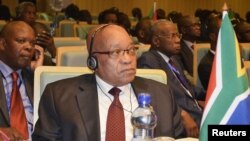ADDIS ABABA – The African Union (AU) Peace and Security Council says the strengthening grip of Islamist militants in northern Mali poses a serious threat to regional stability.
African leaders meeting in the Ethiopian capital, Addis Ababa, affirmed their support for a military intervention in Mali if necessary Saturday.
The leaders met ahead of an AU summit to discuss ongoing security concerns in the region. Topping the agenda was Mali.
AU commissioner for Peace and Security Ramtane Lamamra, reading from a communique issued after the meeting, said the situation in the country poses a “serious threat to regional and international peace.”
“Council expressed its deep concern at the seriousness of the situation in northern Mali marked by the strengthening of the grip of armed terrorist and criminal groups in the area," Lamamra said. "Council also noted with concerns on reports of the presence of a number of non-Malian armed groups.”
Islamist militants have seized control of towns in northern Mali, in the wake of a political rebellion launched by Tuareg separatists earlier this year.
The Peace and Security Council reaffirmed its support for the efforts of the West African regional bloc ECOWAS to re-establish stability in the country. That includes authorizing ECOWAS to organize a military intervention.
The chairman of the council, Ivory Coast President Alassane Ouattara, told reporters the regional bloc is working on a plan right now.
He said there is a team in the Malian capital, Bamako, working with the Malian army to identify the country's needs. Ouattara called it a “work in progress” and said in the coming days, they should be able to send the African Union details of the plan, which they can use to appeal to the United Nations Security Council.
ECOWAS is awaiting a formal request by the Malian government and official backing from the United Nations Security Council to carry out the military option.
In prepared remarks for the AU Peace and Security Council meeting, U.N. Deputy Secretary General Jan Eliasson said military action “should only be considered if all avenues for dialogue have been exhausted.”
The council also reviewed progress on negotiations between Sudan and South Sudan on the disputes left unresolved following their separation last year.
The communique, as read by commissioner Lamamra, says the council welcomes the withdraw of forces from the disputed Abyei region, and a “new spirit of strategic partnership” adopted by both sides.
Negotiators from the two countries resumed talks Thursday on security and border issues, but have so far failed to reach agreement.
Sudanese President Omar al-Bashir and South Sudanese President Salva Kiir were both in attendance at Saturday's meeting.
African leaders meeting in the Ethiopian capital, Addis Ababa, affirmed their support for a military intervention in Mali if necessary Saturday.
The leaders met ahead of an AU summit to discuss ongoing security concerns in the region. Topping the agenda was Mali.
AU commissioner for Peace and Security Ramtane Lamamra, reading from a communique issued after the meeting, said the situation in the country poses a “serious threat to regional and international peace.”
“Council expressed its deep concern at the seriousness of the situation in northern Mali marked by the strengthening of the grip of armed terrorist and criminal groups in the area," Lamamra said. "Council also noted with concerns on reports of the presence of a number of non-Malian armed groups.”
Islamist militants have seized control of towns in northern Mali, in the wake of a political rebellion launched by Tuareg separatists earlier this year.
The Peace and Security Council reaffirmed its support for the efforts of the West African regional bloc ECOWAS to re-establish stability in the country. That includes authorizing ECOWAS to organize a military intervention.
The chairman of the council, Ivory Coast President Alassane Ouattara, told reporters the regional bloc is working on a plan right now.
He said there is a team in the Malian capital, Bamako, working with the Malian army to identify the country's needs. Ouattara called it a “work in progress” and said in the coming days, they should be able to send the African Union details of the plan, which they can use to appeal to the United Nations Security Council.
ECOWAS is awaiting a formal request by the Malian government and official backing from the United Nations Security Council to carry out the military option.
In prepared remarks for the AU Peace and Security Council meeting, U.N. Deputy Secretary General Jan Eliasson said military action “should only be considered if all avenues for dialogue have been exhausted.”
The council also reviewed progress on negotiations between Sudan and South Sudan on the disputes left unresolved following their separation last year.
The communique, as read by commissioner Lamamra, says the council welcomes the withdraw of forces from the disputed Abyei region, and a “new spirit of strategic partnership” adopted by both sides.
Negotiators from the two countries resumed talks Thursday on security and border issues, but have so far failed to reach agreement.
Sudanese President Omar al-Bashir and South Sudanese President Salva Kiir were both in attendance at Saturday's meeting.




